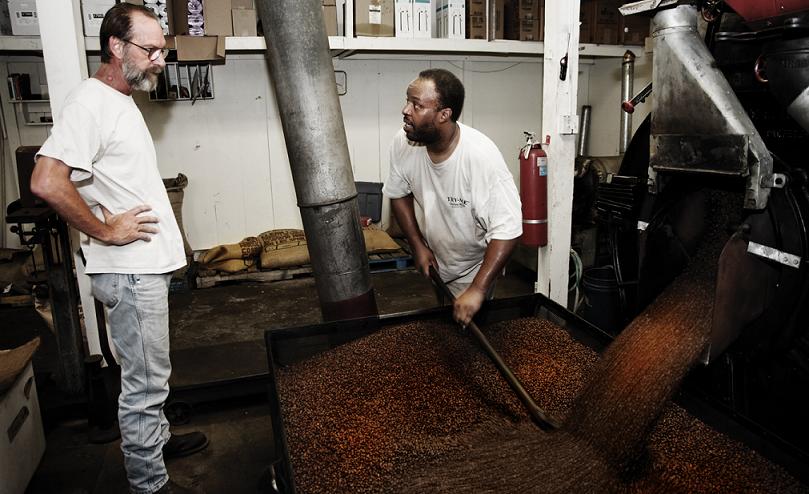It’s a typical Tuesday morning at Try-Me Coffee—roasting coffee, contacting clients and filling out police reports. According to third-generation owner Bob Lutz, “I got in this morning and found out they stole my van again. You get the feeling, ‘Okay, we’ll sell out and get out of here.’ But I can’t afford to retire; I’m too young for that!”
For the Bywater-based Try-Me Coffee, joining the tier of the Crescent City’s household favorites such as Community Coffee or French Market has proven as daunting as the everyday nuisances Lutz tackles. But the roasters at Try-Me are no amateurs when it comes to their craft. The Try-Me Coffee Mill has been serving “discriminating coffee lovers” since 1925. Its name isn’t a household brand, but Try-Me has likely soothed your craving for a cup of brew at one of the many restaurants or coffee shops it supplies.
Try-Me has been in business for nearly a century, but the brand name is as unrecognizable as the mill itself. Nestled in the middle of its block in the Bywater, the mill’s outward appearance is camouflaged, blending in with the surrounding neighborhood homes. From the street, it looks like just another house, with the same iron doors that it had when it was built in 1925. The mill also holds the original roaster that was used by Try-Me’s founder, Henry Kelper.
Lutz has upheld his grandfather’s tradition of roasting and blending coffee to precise shades while providing distinct local blends. “King Cake,” “Mardi Gras,” “Southern Delight” and “Toasted Southern Pecan” are among the flavors that you won’t find up North. But the fact that Try-Me Coffee has been around for so long raises a question: Why haven’t we heard of you?
“I’ve tried all kinds of advertising, and for some reason none of it works,” Lutz says. “It’s amazing how many people walk up [at catering events], read the sign and say, ‘I know who you are. I thought y’all went out of business?’”
The Try-Me brand has not gone out of business, and every sip of brew has been influenced by the history of the city. When blockades closed the port of New Orleans during the Civil War, the city was unable to get many common necessities, including coffee. New Orleanians became resourceful and reinvented the flavor with a local ingredient, chicory root.
Today, one-third of all coffee imported to North America enters through New Orleans. With such a relationship with coffee, New Orleans’ coffee companies take pride in providing locals with original tastes and flavors. CC’s, PJ’s and Rue de la Course are among the few that have helped keep Starbucks at bay.
Like so many other local businesses, Try-Me struggled to return after Hurricane Katrina.
“We gutted the entire building down to the walls. Thank God I have great friends,” Lutz says. “One of the guys that came in town left his wife who had just had twins, and one [of the twins] died. She was in the hospital, and the baby was in the hospital. He left them and came down here to work for me for about three months doing whatever it took.
“A bunch of people didn’t come back. One lived right below the bridge and lost everything—the house, the whole nine yards. He and his family relocated to Houston. He would come in four days a week, we would bust butt, and then he’d go back to Houston for a couple days.”
In addition to loyal workers, Lutz also has a regular, familiar clientele: Rue de la Course, Café Degas, Court of Two Sisters, Sun Ray Grill and Antoine’s are among the many companies Lutz sells to. Lutz also sells coffee flavors exclusive to Aunt Sally’s Praline Company, including Crème Brulée and Pralines ’n’ Crème.
Try-Me Coffee caters to anyone interested in their coffee, whether it’d be a weekly visit from neighbors on roasting day or making home deliveries. (Try-Me delivers on Wednesdays and Fridays to customers who purchase five pounds or more.)
“That’s how my grandfather got the name ‘Try-Me Coffee,’” Lutz says. “He would go down Franklin Avenue back when it was a dirt road, banging on doors to see if they wanted to try some coffee.”
But new neighbors don’t always realize that they’re sharing the block with a coffee mill.
“In the winter time, when you’re roasting an espresso or something, it’ll steam, and a new neighbor will call the fire department,” Lutz says. “[The fire department] generally walks out with a box of coffee. Sometimes they show up when they know we’re roasting. I figured that one out.”





